| Written by: | Students |
| Date posted: | February 2, 2020 |
| Posted in: | Home / Information / |
What surprised me about England
 Hi, my name is Dennis and I have lived in England for 4 months now. I am from Germany, and want to give you an insight into what has surprised me during my stay. While some of these surprises might seem to be rather small and insignificant, I think that these small things contribute to your experience and give you the perfect immersion in a country. Plus, they are always a great start for a conversation!
Hi, my name is Dennis and I have lived in England for 4 months now. I am from Germany, and want to give you an insight into what has surprised me during my stay. While some of these surprises might seem to be rather small and insignificant, I think that these small things contribute to your experience and give you the perfect immersion in a country. Plus, they are always a great start for a conversation!
This is a list of all the things that baffled me, made me happy, or even a bit mad. Enjoy!
Roadwork ahead? I sure hope it does!
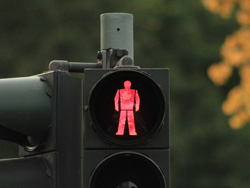 One of the major differences between England and Germany almost cost me my head on the first day. I am talking about road lanes. In theory, you know that the lanes are the opposite to European lanes, but in the moment you don’t think it through – at least, I didn’t. This resulted in me looking left (instead of right, where a car was coming) and almost crossing the road. Luckily, I heard the car before I moved forward and looked right – still thinking in German, I didn’t expect there to be a car about to hit me! – and was quite surprised as it passed me.
One of the major differences between England and Germany almost cost me my head on the first day. I am talking about road lanes. In theory, you know that the lanes are the opposite to European lanes, but in the moment you don’t think it through – at least, I didn’t. This resulted in me looking left (instead of right, where a car was coming) and almost crossing the road. Luckily, I heard the car before I moved forward and looked right – still thinking in German, I didn’t expect there to be a car about to hit me! – and was quite surprised as it passed me.
You’d think I learned my lesson, right? Not really. It took me weeks to really understand how the roads worked. I had to ignore what I’d learned and practised for over 20 years, but after a month or two I knew where to look. In this time frame I was checking both lanes at least 3 times before I crossed the street.
Another road-related revelation was walking when the traffic light is red. A little bit of context here: in Germany, you don’t cross the street if the traffic right is red. The chance to get shamed by others is always there – especially if there are children around, when you’re expected to be a good role model. Well, here in England, everybody crosses the road when the pedestrian light is red. Young people, parents with children, the elderly – whoever you are, it doesn’t really matter: if there is no car coming, why wait for the green man to appear? One of the ‘am I an actual alien?’ moments I had was when everybody crossed on the red light except me. Luckily, I have adapted this and now proudly live the English way!

Strange trains
 Speaking of transport, one thing I have noticed is that going by train is not the most favourite way to travel in England. For one, the tickets are quite expensive (in comparison to the bus, for example). Also, it can be a bit confusing, especially for a foreigner. I’m living close to where I work here, so I don’t take the train a lot. On the times I did, I found it hard to tell what train I needed!
Speaking of transport, one thing I have noticed is that going by train is not the most favourite way to travel in England. For one, the tickets are quite expensive (in comparison to the bus, for example). Also, it can be a bit confusing, especially for a foreigner. I’m living close to where I work here, so I don’t take the train a lot. On the times I did, I found it hard to tell what train I needed!
Many of the trains don’t have any numbers or names like they do in Germany. In the UK, the final stop is normally shown on the front of the driver’s carriage – especially on main routes – but for regional trains often there is no label displaying where the train is going. Also, if you arrive on the platform when the train is waiting and can’t see the front, there might not be anything on the side to tell you the route! In larger stations, there is usually an electronic board on each platform showing the stops of the next train, and maybe even an announcement on the tannoy, but in smaller stations it can be very confusing. Sure, it’s the right platform and the right time, but there is still no obvious indicator that this is the train for your trip. British trains are notoriously late. It takes a bit of getting used to!
If you want to take the train and are under 25, you can save some money by buying a Young Person’s Railcard. This costs £30 per year and you will get a third off the ticket price. There are other railcards you can buy, as well as transport passes like the Oyster Card in London, which are useful if you travel a lot by train.
Retail in England
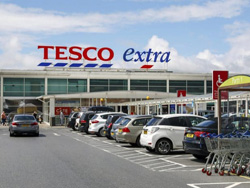 The biggest game-changer for me was retail. Not as dangerous or important as traffic, but even more different to what I am used to in Germany. Where do I begin? One of the weirdest things for me was the fact that almost every store is open on Sunday.
The biggest game-changer for me was retail. Not as dangerous or important as traffic, but even more different to what I am used to in Germany. Where do I begin? One of the weirdest things for me was the fact that almost every store is open on Sunday.
I arrived in the UK on a Saturday and my roommate told me casually that I can get some groceries tomorrow. I thought she had forgotten which day it was. As I arrived at the nearest store, I checked the opening times and – good lord, they really are open on Sunday! The unthinkable has come true … If you ask yourself who shops for groceries on a Sunday – everybody does. It’s actually quite busy. But besides that, most supermarkets are open until 10pm Monday to Saturday, and some are open 24 hours. Sure, these shops also exist in Germany, but they are in bigger cities and they mostly open from Monday to Friday. Even these big stores in key cities are all closed on Sundays.
The upper end of the supermarket food chain here is Tesco, by far*. Tescos can be huge – no, gigantic – and most are open from 6am to 12pm. You can buy everything there and, most importantly: they are everywhere. I was blown away by the size and selection of these things. Need medicine? Tesco. Want to buy videogames? Tesco. New clothes? Tesco. The Holy Grail? Probably Tesco. And if you think you’ve found the biggest Tesco in town, someone will tell you about ‘the Big Tesco’. There is always a bigger fish.
*N.B. from the other staff at Apple Languages: Tesco is not a high-end supermarket. It’s a perfectly normal British supermarket, but you can buy lots of things there. There are several types, and the ‘gigantic’ one Dennis refers to is a ‘Tesco Extra’, which has a large homeware section. We’ve had some interesting cross-cultural conversations in the office about English vs. European supermarkets!
Cash or card?
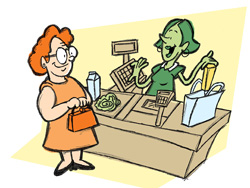 Retail here lives in the year 3020 while Germany is stuck somewhere in the early 2000s. You can pay with card everywhere. Literally everywhere. Small example: in many German restaurants or smaller shops, card payment is unthinkable – it’s cash or nothing (and don’t even dare to ask to pay by smartphone). Even in bigger cities, this phenomenon will occur. In Germany, cash is king. In England, you can eat at the shabbiest burger van on the side of the road and they will gladly accept card payment. Some people I’ve met just don’t use cash anymore, and I can’t blame them. Actually, most card machines accept Apple Pay or a similar smartphone app, so you don’t even need your card these days.
Retail here lives in the year 3020 while Germany is stuck somewhere in the early 2000s. You can pay with card everywhere. Literally everywhere. Small example: in many German restaurants or smaller shops, card payment is unthinkable – it’s cash or nothing (and don’t even dare to ask to pay by smartphone). Even in bigger cities, this phenomenon will occur. In Germany, cash is king. In England, you can eat at the shabbiest burger van on the side of the road and they will gladly accept card payment. Some people I’ve met just don’t use cash anymore, and I can’t blame them. Actually, most card machines accept Apple Pay or a similar smartphone app, so you don’t even need your card these days.
Here is something to be aware of if you tend to be socially awkward. In most shops, the cashier will ask, “How are you?” when they first see you, which caught me off guard in the beginning. I was so confused. Is that a rhetorical question? Does the person in front of me want a real answer? This fight within me resulted in a weird silence. After a while, I learned it seems to be fine to just answer with, “Good, thanks,” or “Alright?” – or even just, “Hi”. ‘How are you?’ is more of a general greeting in English, the same as ‘Hello’ and ‘Alright?’ – which doesn’t actually mean, “I’m alright,” but is more like, “Are you alright?”. And in England, even if you’re not alright, you’re supposed to say, “yes”. Baffling!
A note on English shops
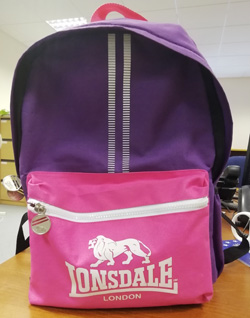 A really weird thing in England is the high number of hairdressers in towns and cities. They are everywhere. It feels like every street has its own hairdresser, which seems to be ridiculous. The market is surely saturated – it’s not good economics! There is some kind of conspiracy, I’m sure. They all seem to do well enough to stay in business, however, so I may have to surrender to this riddle.
A really weird thing in England is the high number of hairdressers in towns and cities. They are everywhere. It feels like every street has its own hairdresser, which seems to be ridiculous. The market is surely saturated – it’s not good economics! There is some kind of conspiracy, I’m sure. They all seem to do well enough to stay in business, however, so I may have to surrender to this riddle.
A type of shop I have enjoyed visiting is English charity shops. These are second-hand stores where the proceeds go to charities, and there are lots of different kinds. Smaller shops usually sell clothes and ‘knick-knacks’, which is a weird English word that means household items and generally low-value decorations. Bigger shops sell furniture like sofas and dressers, and larger decorations like mirrors or wall art. We don’t have this kind of store in Germany – we have second-hand shops, but not shops where the money goes to a good cause, which I liked the idea of. The best thing, though, is that you can often find really great hidden gems for an awesome price. I bought my rucksack for £2! Yes, £2!!
Consumables
In England, you will have the opportunity to try many different biscuits with your tea, because they love biscuits and tea here. You really should try the different kinds, but beware one kind of biscuit: the Ginger Nut. The name gives it away already: this biscuit contains ginger. By god, it is devastating.
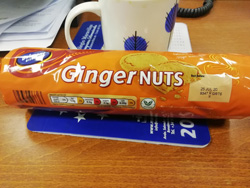
While English people swear on the tastiness of a Ginger Nut, foreigners have a second opinion on that. My first interaction with this biscuit was on my second weekend, as I went into the local Lidl. To be fair, I just read that they cost 25 pence and decided to buy them without even looking at the name. I thought I would eat a mild and slightly sweet biscuit like others I had tasted here. I bit into it, only to feel burning spiciness on my tongue. At first, I thought the problem was me, but as I read the packaging, I realised that people in England put ginger in their biscuits and they take pride in it! Strange.
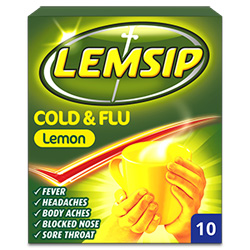
Another thing about the world of food in England: they don’t have brown bread. Not real brown bread, anyway. In Germany, our bread is firm and made with rye flour; we call it ‘black bread’ for its dark colour. The only bread you seem to find in England is toasting bread, or plain white slices. There are many different brands of bread but in the end it’s toasting bread, and you better toast it. Even their brown bread isn’t right – it’s too soft! If you like it that way, the local supermarkets will serve you fine, but if you want something firm to bite, you are almost lost. It took me weeks to find something equally good as German black bread. Try to come to terms with that fact. (Guess where I found the best bread? Tesco.)
If you get sick during your time in England, you might get offered a Lemsip. This is a concept I haven’t seen before: lemon-flavoured paracetamol powder that you put in hot water to drink. It works just fine and will make you feel better, don’t worry. But there is a trade-off: its taste can be quite overwhelming. The first Lemsip I tried was bitter – like, bitter. It gave me goosebumps and made me cringe with every sip. But, in the end, my cold was gone, so this might be a necessary evil!
National dishes
 England’s food can be also quite amazing. As a German, I had no clue about savoury pies, for example, which is actually a really key meal here. Sure, I have seen them in movies, but this is just not a thing in Germany, where pies are sweet and eaten as dessert. At a local ‘pie night’ (a sort of self-service restaurant serving pies and sides near our office), I had the chance to taste this popular dish and I was amazed!
England’s food can be also quite amazing. As a German, I had no clue about savoury pies, for example, which is actually a really key meal here. Sure, I have seen them in movies, but this is just not a thing in Germany, where pies are sweet and eaten as dessert. At a local ‘pie night’ (a sort of self-service restaurant serving pies and sides near our office), I had the chance to taste this popular dish and I was amazed!
Pies have many different fillings – choose from meat, fish, vegetarian, or even vegan ones. In combination with mashed potatoes and vegetables like carrots and greens, this becomes a true rollercoaster of flavour. For a truly English experience, put gravy on your pie! If you have the chance to get your hands on a savoury pie during your time in the UK, do so; you really won’t regret your choice.
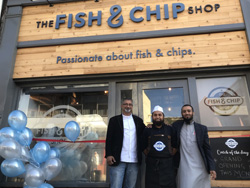
You can also visit a ‘chip shop’ in England. Yes, there are whole shops (locally called ‘chippies’) dedicated to one of the most popular side dishes ever created. This is because chips aren’t just a side dish here; they can be a meal in themselves, such as the ‘cone of chips’, which is portion of chips in a paper cone.
Chips in England usually form part of fish and chips, which is one of the national dishes of England. Whitefish is fried in batter and served with chips which are way thicker than the average fry, making the meal very filling. The whole thing is served with salt and vinegar and – depending on where you come from – curry sauce, mushy peas, or gravy.
It turns out that curry sauce is more popular in the South, mushy peas in the Midlands, and gravy in the North. Some people feel very strongly about this choice! For the real English experience, get yourself chips in a bun – or a ‘chip butty’. Sounds weird, but it’s actually really common.
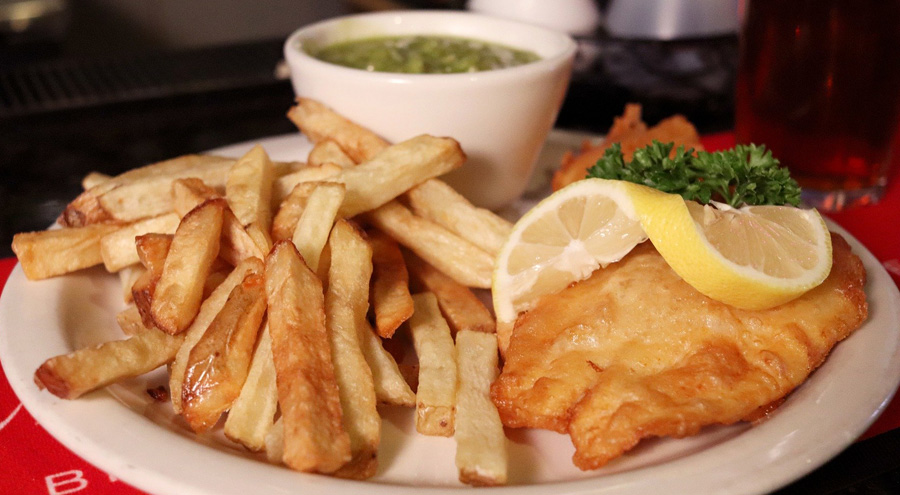
My experience
Learning a language at high school or by yourself versus speaking the language surrounded by native speakers is the best example of the major difference between theory and practise. While this may sound scary at first, it is one of the most beneficial experiences you can have. Especially in terms of pronunciation, it’s a true revelation – at least for me. Getting to know new aspects of English while simultaneously discovering different parts of the culture is a whole new level of language learning. Taking this even further and travelling to England to learn English in a specialist language school is certainly the best way to make the most progress.

One thing to keep in mind if you’re thinking about an immersive experience: trust yourself. Even if it feels like you just completely forgot every word of the language, you can speak better than you think! Learning from the people who speak the language gives you a better understanding of how the words fit together, how the grammar works, and – especially in the case of English – how to pronounce those words that don’t seem to make any sense, like ‘yacht’ (it’s “yot”). Crazy English …
This article was written by Dennis, February 2020
Blog Categories
- Activities (4)
- Yoga (1)
- Christmas Courses (17)
- Food (21)
- Recipes (4)
- Information (83)
- Instagram (11)
- Language fun (11)
- My travel journal (15)
- Sample Programmes (2)
- Video Guides (11)
- Locations (430)
- America (4)
- Argentina (15)
- Bariloche (4)
- Buenos Aires (8)
- Cordoba (2)
- Mendoza (1)
- Australia (1)
- Sydney (1)
- Austria (4)
- Brazil (5)
- Maceio (2)
- Salvador da Bahia (2)
- Sao Paulo (1)
- Canada (8)
- Chile (4)
- China (7)
- Colombia (2)
- Costa Rica (8)
- Flamingo Beach (5)
- Monteverde (1)
- Cuba (8)
- Havana (3)
- Santiago de Cuba (3)
- Trinidad (2)
- Czech Republic (2)
- Prague (2)
- Dominican Republic (1)
- Santo Domingo (1)
- Ecuador (3)
- Egypt (2)
- Cairo (2)
- England (23)
- Bournemouth (1)
- Brighton (1)
- Bristol (1)
- Cambridge (2)
- Liverpool (9)
- London (3)
- Manchester (2)
- Oxford (1)
- Portsmouth (1)
- France (53)
- Germany (49)
- Greece (4)
- Guadeloupe (3)
- Guatemala (2)
- Antigua (2)
- Ireland (4)
- Italy (78)
- Japan (3)
- Latvia (1)
- Riga (1)
- Malta (3)
- Mexico (10)
- Cuernavaca (1)
- Guadalajara (1)
- Guanajuato (1)
- Mexico City (1)
- Playa del Carmen (6)
- Morocco (1)
- Rabat (1)
- Netherlands (4)
- Panama (1)
- Bocas del Toro (1)
- Boquete (1)
- Peru (5)
- Poland (2)
- Portugal (9)
- Russia (6)
- Moscow (2)
- St Petersburg (2)
- Scotland (2)
- Edinburgh (2)
- Spain (89)
- Alicante (1)
- Barcelona (13)
- Bilbao (1)
- Cadiz (1)
- Costa Adeje (1)
- El Puerto (3)
- Granada (5)
- Ibiza (1)
- Lanzarote (1)
- Madrid (6)
- Malaga (15)
- Marbella (1)
- Murcia (1)
- Nerja (4)
- Pamplona (1)
- Puerto de la Cruz (3)
- Salamanca (3)
- San Sebastian (7)
- Santiago de Compostela (2)
- Seville (5)
- Tenerife (6)
- Valencia (9)
- Vejer de la Frontera (2)
- Sweden (2)
- Stockholm (1)
- Switzerland (2)
- Montreux (1)
- Ukraine (2)
- Kiev (2)
- United Arab Emirates (1)
- Dubai (1)
- Uruguay (1)
- Montevideo (1)
- New Schools (14)










 Company Number: 08311373
Company Number: 08311373